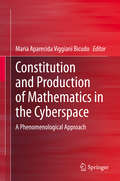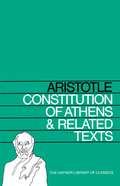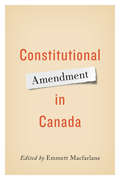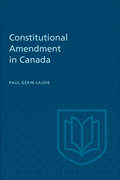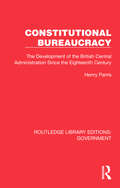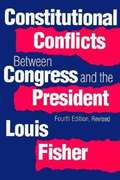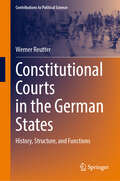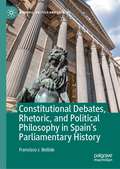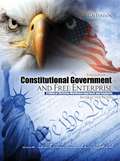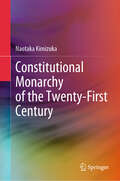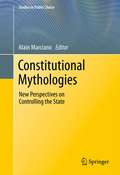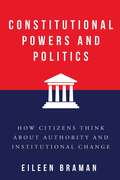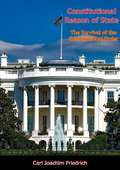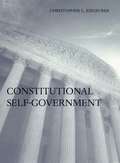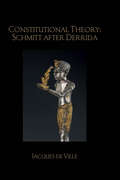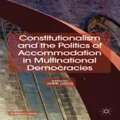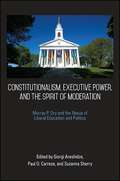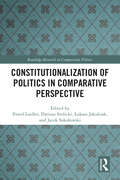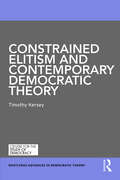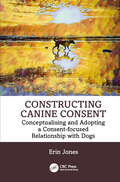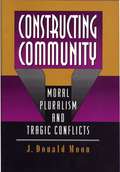- Table View
- List View
Constitution and Production of Mathematics in the Cyberspace: A Phenomenological Approach
by Maria Aparecida Viggiani BicudoThis book brings together various studies that assume phenomenology to analyze how mathematics education is affected by the experience of being in the cyberspace. The authors of the chapters included in this contributed volume work with the theoretical framework developed by authors such as Edmund Husserl, Martin Heidegger and Maurice Merleau-Ponty to investigate how mathematics is produced and comprehended in a new way of being in the world, with digital technologies. The aim of this book is not to explain the tools used and how one works with them in the cyberspace, aiming at better teaching and learning mathematics. Its purpose is to present philosophical investigations that contribute to the understanding of the complexity of the world in which we are being researchers and mathematics teachers. By doing so, Constitution and Production of Mathematics in the Cyberspace – A Phenomenological Approach will help researchers and mathematics teachers understand their role in a world in which the experience of teaching and learning mathematics is being radically changed by new technologies and new ways of being in this world.
Constitution of Athens and Related Texts
by AristotleA refreshing approach to the study of major Western philosophers. Introductory essays by noted scholars enliven each volume with insights into the human side of the great thinkers, and provide authoritative discussions of the historical background, evolution and importance of their ideas. Highly recommended as stimulating classroom text.
Constitutional Amendment in Canada
by Emmett MacfarlaneIn Canada, the 1982 Constitution Act contains the amending formula, which outlines a set of procedures required to make changes to the constitution. Recent debates over Senate reform, the status of the Supreme Court of Canada, and the rules governing royal succession have highlighted how important the amending formula is in maintaining the vitality and relevance of the governing system. Constitutional Amendment in Canada is the first volume to focus solely on the implications of the amending formula in Canada. Emmett Macfarlane has brought together a group of expert authors to address such topics as the difficulties of constitutional reform, the intersection of various levels of government and the judiciary, and the ability of the public to veto proposed changes. Filling a serious gap in the literature, Constitutional Amendment in Canada is an authoritative study of the historical and contemporary implications of the amending formula.
Constitutional Amendment in Canada
by Paul Gérin-LajoieOn one of the most important and controversial matters in Canada—the drafting of an amending clause to the British North America Act. A forceful, lucid discussion of past amendments, conflicting views, and a possible solution. This book won the Grand Prize of the Province of Quebec for Moral and Political Science in 1950. Canadian Government Series.
Constitutional Bureaucracy: The Development of the British Central Administration Since the Eighteenth Century (Routledge Library Editions: Government)
by Henry ParrisOriginally published in 1969, this book discusses specific issues in the rise of a ‘constitutional bureaucracy’ as a counter-part to constitutional monarchy. These issues, including patronage, ministerial power and responsibility and the ‘grey-eminence’ myth are set against the relationship among legislation and administration, Treasury control and the relevance of public administration to our conception of public accountability and ‘representative bureaucracy.’
Constitutional Conflicts between Congress and the President
by Louis FisherThis text covers issues relating to conflicts between congress and the President. The scan is in tact, but has numorous footnotes, so the reader needs to be aware of these at the botton of each page.
Constitutional Courts in the German States: History, Structure, and Functions (Contributions to Political Science)
by Werner ReutterThe book takes stock on constitutional adjudication in the German states. It includes surveys on the Constitutional Court in Berlin, the origins and development of state constitutional courts in Germany, their status and mode of operation, their justices, and the role these courts play at the subnational level in Germany.
Constitutional Debates, Rhetoric, and Political Philosophy in Spain’s Parliamentary History (Rhetoric, Politics and Society)
by Francisco J. BellidoThis book examines the conceptual contributions of constituent representatives in Spain during the nineteenth and twentieth centuries. The Spanish Parliament has been the stage for the political modernisation of the country. Constitutional debates have historically led to the gradual acknowledgement and broadening – usually unevenly – of citizens’ rights. At the same time, constitutional debates have created opportunities to design institutions and settle legal mechanisms to enforce rights and distribute state resources. The book identifies and analyses rhetorical and conceptual innovations produced in such debates from a historical perspective.
Constitutional Government and Free Enterprise: A Biblical Christian Worldview Approach and Emphasis: Interactive Notes
by Gai Ferdon“Constitutional Government and Free Enterprise: A Biblical Christian Worldview Approach and Emphasis, Interactive Notes originated from the need to further equip my own freshman students here at Liberty University with an understanding of the basic core essentials and components of worldviews of the Western tradition, with specific focus on the Biblical Christian worldview and its impact on American history and institutions. After years of teaching worldview studies and similar materials at the undergraduate and even high school levels, I became better acquainted with the intellectual challenges students faced, and decided to create a series of class lecture notes to coordinate with required course texts for an entry-level course designed specifically for government majors within the Helms School of Government. The first set of these lectures was compiled and augmented into a first edition in 2014, and revised again into a second edition in the spring of 2019. This third edition contains more interactive features intended to enhance the readers learning experience.” – from the author’s Preface.
Constitutional Monarchy of the Twenty-First Century
by Naotaka KimizukaThis is the first book to investigate how constitutional monarchy could survive in the twentieth and twenty-first centuries, during which many monarchies were overthrown by revolutions or coups d’état in Asia, the Middle East, Africa and Europe. Today we have about 200 countries in the world, but there are only 28 which have their own monarchical sovereigns – emperor, king, queen, grand duke, prince, sultan or emir – and even if we add the Commonwealth realms to these, we would find almost three-quarters of the globe are republics at this moment. So will monarchy disappear from human history in the not-too-distant future? This book shows how the European monarchs have played important roles not only as heads of state, but also as heads of nation, in which they are symbols of unity and national identity, of continuity and stability, fountainheads of national achievement and success, and supporters of social service. Consequently they have grappled with difficult contemporary issues such as social welfare, the global environment, the protection of wildlife, multiculturalism and the LGBT movement which national governments would not be able to deal with sufficiently in each country. This book also suggests reforming the existing emperor system of Japan in reference to the activities of European constitutional monarchy.
Constitutional Morality and the Rise of Quasi-Law
by Bruce P. FrohnenAmericans are ruled by an unwritten constitution consisting of executive orders, signing statements, and other quasi-laws designed to reform society, Bruce Frohnen and George Carey argue. Consequently, the Constitution no longer means what it says to the people it is supposed to govern and the government no longer acts according to the rule of law.
Constitutional Mythologies: New Perspectives on Controlling the State (Studies in Public Choice #23)
by Alain MarcianoOur societies obviously rest on common beliefs. These "myths" are tools that help us to develop and build common identities; they form the structure around which societies function. This does not imply that these beliefs are "true," in the sense that they would be supported by empirical facts. In social matters, myths have undoubtedly important functions to play even if no empirical facts support them. On the other hand, and precisely because they are not discussed, myths may be problematic: they may create illusions, conserve structures that are inefficient and unable to improve the situation of citizens. This is particularly true with constitutions. Constitutions are very important for societies: a constitution is a document -- even in societies based on "unwritten" constitutions -- which binds citizens together, creating unity among them, and which forms the framework within which our activities take place. As Nobel Prize laureate James Buchanan used to say: constitutions contain the rules of the social game we play in our everyday life. However, constitutions are not frequently debated by citizens. This is why we end up with common beliefs about these constitutions: they are above our heads, around us. We take them, their role, function, and nature as given. The purpose of this volume to investigate and challenge common constitutional myths. Featuring contributions from prominent economists, political scientists, and legal scholars, the chapters in this volume address such myths as "constitutions are binding social contracts," "constitutions are economic documents" and "constitutions are legal documents." Illustrating their analyses with historical and contemporary examples from the United States, Canada, and Europe, the authors build a multi-layered approach to understanding constitutions and their implications for social and political influence.
Constitutional Powers and Politics: How Citizens Think about Authority and Institutional Change (Constitutionalism and Democracy)
by Eileen BramanThe relationship between public opinion and the actions of institutions such as the Supreme Court has come under increased scrutiny in recent years. In this timely book, Eileen Braman explores how American citizens think about government across all three branches, applying a rigorous political scientific methodology to explore why citizens may support potentially risky changes to our governing system.As Braman highlights, Americans value institutions that they perceive as delivering personal and societal gains, and citizens who see these institutions as delivering potential losses are more supportive of fundamental constitutional change. In the face of growing resentment of government and recurring warnings of constitutional crisis, Braman offers a hopeful note: her findings suggest that politicians can channel discontent toward meaningful reform and the healthy evolution of our democratic system.
Constitutional Reason of State: The Survival of the Constitutional Order
by Carl Joachim FriedrichTHE PRESENT STUDY proposes to explore the history of the problem of ‘reason of state’ in a constitutional political order. The writers treated belong among the ‘great’ in modern political thought and therefore it is not and cannot be a question of dealing with the integral thought of the writers here examined. All we can hope to do is to seek out those aspects which bear more immediately upon this particular problem. Ratio status,—the very term shows that we are moving within the context of the great tradition of Western rationalism, where everything has its particular ratio or inner rationale which it behoves the mind to grasp and to understand. For the idea of such rationes is prominent in the Middle Ages,—an aspect of the matter which receives scant attention in Friedrich Meinecke’s magistral treatment of the subject Die Idee der Staatsräson in der Neueren Geschichte published in 1925 and by now become something of a classic. Perhaps partly because of his lack of sympathy for this rational basis of the idea which he was discussing, he also paid scant attention to that aspect of it which we are particularly concerned with here: reason of state in its application to the government of law, the constitutional order, in short ‘constitutional reason of state’ or more precisely ‘reason of the constitutional state.’
Constitutional Self-government
by Christopher L. EisgruberMost of us regard the Constitution as the foundation of American democracy. How, then, are we to understand the restrictions that it imposes on legislatures and voters? Why, for example, does the Constitution allow unelected judges to exercise so much power? And why is this centuries-old document so difficult to amend? In short, how can we call ourselves a democracy when we are bound by an entrenched, and sometimes counter-majoritarian, constitution? In Constitutional Self-Government, Christopher Eisgruber focuses directly on the Constitution's seemingly undemocratic features. Whereas other scholars have tried to reconcile these features with majority rule, or simply acknowledged them as necessary limits on democracy, Eisgruber argues that constitutionalism is best regarded not as a constraint upon self-government, but as a crucial ingredient in a complex, non-majoritarian form of democracy. In an original and provocative argument, he contends that legislatures and elections provide only an incomplete representation of the people, and he claims that the Supreme Court should be regarded as another of the institutions able to speak for Americans about justice. At a pivotal moment of worldwide interest in judicial review and renewed national controversy over the Supreme Court's role in politics, Constitutional Self-Government ingeniously locates the Constitution's value in its capacity to sustain an array of institutions that render self-government meaningful for a large and diverse people.
Constitutional Theory: Schmitt After Derrida (Birkbeck Law Press)
by Jacques de VilleThis book advances a new reading of the central works of Carl Schmitt and, in so doing, rethinks the primary concepts of constitutional theory. In this book, Jacques de Ville engages in a close analysis of a number of Schmitt’s texts, including Dictatorship (1921), The Concept of the Political (1927), Constitutional Theory (1928), Land and Sea (1942), Ex Captivitate Salus (1950), The Nomos of the Earth (1950) and The Theory of the Partisan (1963). This engagement takes place from the perspective of constitutional theory and focuses specifically on concepts or themes such as sovereignty, the state, the political, constituent power, democracy, representation, the constitution and human rights. The book seeks to rethink the structure of these concepts in line with Derrida’s analysis of Schmitt’s texts on the concept of the political in Politics of Friendship (1993). This happens by way of an analysis of Derrida’s engagement with Freud and other psychoanalysts. Although the main focus in the book is on Schmitt’s texts, it further examines two texts of Derrida (Khōra (1993) and Fors: The Anglish Words of Nicholas Abraham and Maria Torok (1976)), by reading these alongside Schmitt’s own reflections on the positive concept of the constitution.
Constitutionalism and the Politics of Accommodation in Multinational Democracies
by Jaime LluchThis collection presents a nuanced analysis of a wide variety of cases that cover the spectrum of constitutional strategies of accommodation used by multinational states such as Canada, Spain, and the United Kingdom. Although constitutionalism has traditionally been the primary mechanism for facilitating the mutual accommodation of national diversity, there is a need to bridge comparative politics and comparative constitutional law. The notion of accommodation in plurinational polities needs to be unpacked and disaggregated, and all of its multiple dimensions analyzed, in order to integrate comparative politics and comparative constitutional law into the analysis. The essays in the book explore three fundamental dimensions of the politics of accommodation: constitutionalism, political culture, and nationalism. Adopting a syncretistic approach to the multiple dimensions of the politics of accommodation, this collection opens up new intellectual vistas, and provides the reader with an appreciation of the contribution that political science perspectives can make to law, and how law and jurisprudence can enrich the study of politics.
Constitutionalism and the Rule of Law
by Maurice Adams Anne Meuwese Ballin Ernst HirschRule of law and constitutionalist ideals are understood by many, if not most, as necessary to create a just political order. Defying the traditional division between normative and positive theoretical approaches, this book explores how political reality on the one hand, and constitutional ideals on the other, mutually inform and influence each other. Seventeen chapters from leading international scholars cover a diverse range of topics and case studies to test the hypothesis that the best normative theories, including those regarding the role of constitutions, constitutionalism and the rule of law, conceive of the ideal and the real as mutually regulating.
Constitutionalism beyond Liberalism
by Michael A. Wilkinson Michael W. DowdleConstitutionalism Beyond Liberalism bridges the gap between comparative constitutional law and constitutional theory. The volume uses the constitutional experience of countries in the global South - China, India, South Africa, Pakistan, Indonesia, and Malaysia - to transcend the liberal conceptions of constitutionalism that currently dominate contemporary comparative constitutional discourse. The alternative conceptions examined include political constitutionalism, societal constitutionalism, state-based (Rousseau-ian) conceptions of constitutionalism, and geopolitical conceptions of constitutionalism. Through these examinations, the volume seeks to expand our appreciation of the human possibilities of constitutionalism, exploring constitutionalism not merely as a restriction on the powers of government, but also as a creating collective political and social possibilities in diverse geographical and historical settings.
Constitutionalism, Executive Power, and the Spirit of Moderation: Murray P. Dry and the Nexus of Liberal Education and Politics (SUNY series in American Constitutionalism)
by Giorgi Areshidze; Paul O. Carrese; Suzanna SherryIn Constitutionalism, Executive Power, and the Spirit of Moderation, contributors ranging from scholars to practitioners in the federal executive and judicial branches blend philosophical and political modes of analysis to examine a variety of constitutional, legal, and philosophical topics. Part 1, "The Role of Courts in Constitutional Democracy," analyzes the proper functions and limits of the judiciary and judicial decision making in constitutional government. Part 2, "Law and Executive Authority," reflects on the tensions between constitutionalism and presidential leadership in both domestic and international arenas. Part 3, "Liberal Education, Constitutionalism, and Philosophic Moderation," shifts the focus to the relationship between constitutionalism and political philosophy, and especially to the modern modes of philosophy that most directly influenced the American Founders. A valuable resource for specialists, the book also will be of use in political science and law school classes.
Constitutionalization of Politics in Comparative Perspective (Routledge Research in Comparative Politics)
by Paweł Laidler Dariusz Stolicki Łukasz Jakubiak Jacek SokołowskiScholars from political science and law examine the latest research on the constitutionalization of politics in comparative perspective.The scope includes both inter- country and intra- country perspectives, institutional and systemic analyses, common and civil law systems, focusing on historical and contemporary case studies. There are chapters limited to a concrete legal and political system, analyzing the tools and processes guarding constitutionalization of politics in such countries as the United States, Germany, France, Italy, Poland, Finland, and Bulgaria, as well as studies offering comparative analysis of various institutions representing different countries and different legal and political systems. Taken together, this book uncovers a wide variety of legal and political cultures, systems of governments, and forms of territorial organization. Once uncovered, this approach makes it easier to determine repetitive patterns which may be observed in constitutional review and constitutional interpretation, or significant differences occurring in the models of constitutionalization of politics around the world.Constitutionalization of Politics in Comparative Perspective tackles important debates among academics interested in the theoretical and practical aspects of constitutions and constitutionalism and will appeal to social scientists, including sociologists, philosophers, security studies and international relations experts but also cultural studies scholars.
Constrained Elitism and Contemporary Democratic Theory (Routledge Advances in Democratic Theory)
by Timothy KerseyToday, examples of the public’s engagement with political issues through commercial and communicative mechanisms have become increasingly common. In February 2012, the Susan G. Komen Foundation reversed a decision to cease funding of cancer screening programs through Planned Parenthood amidst massive public disapproval. The same year, restaurant chain Chic-fil-A became embroiled in a massive public debate over statements its President made regarding same-sex marriage. What exactly is going on in such public engagement, and how does this relate to existing ideas regarding the public sphere and political participation? Is the public becoming increasingly vocal in its complaints? Or are new relationships between the public and economic and political leaders emerging? Timothy Kersey’s book asserts that the widespread utilization of internet communications technologies, especially social media applications, has brought forth a variety of new communicative behaviors and relationships within liberal polities. Through quick and seemingly chaotic streams of networked communication, the actions of these elites are subject to increasingly intense scrutiny and short-term pressure to ameliorate or at least address the concerns of segments of the population. By examining these new patterns of behavior among both elites and the general public, Kersey unearths the implications of these patterns for contemporary democratic theory, and argues that contemporary conceptualizations of "the public’" need to be modified to more accurately reflect practices of online communication and participation. By engaging with this topical issue, Kersey is able to closely examine the self-organization of both elite and non-elite segments of the population within the realm of networked communication, and the relations and interactions between these segments. His book combines perspectives from political theory and communication studies and so will be widely relevant across both disciplines.
Constructing Authorities: Reason, Politics and Interpretation in Kant's Philosophy
by Onora O'NeillThis collection of essays brings together the central lines of thought in Onora O'Neill's work on Kant's philosophy, developed over many years. Challenging the claim that Kant's attempt to provide a critique of reason fails because it collapses into a dogmatic argument from authority, O'Neill shows why Kant held that we must construct, rather than assume, the authority of reason, and how this can be done by ensuring that anything we offer as reasons can be followed by others, including others with whom we disagree. She argues that this constructivist view of reasoning is the clue to Kant's claims about knowledge, ethics and politics, as well as to his distinctive accounts of autonomy, the social contract, cosmopolitan justice and scriptural interpretation. Her essays are a distinctive and illuminating commentary on Kant's fundamental philosophical strategy and its implications, and will be a vital resource for scholars of Kant, ethics and philosophy of law. A vital resource for Kant scholars. Shows how and why Kant's accounts of reason and of politics are linked. Challenges accepted conceptions of autonomy.
Constructing Canine Consent: Conceptualising and adopting a consent-focused relationship with dogs
by Erin JonesThe concept of canine consent is far more than simply a buzzword in modern dog training practices. In its current form, consent is a distinctly human concept, designed by humans and for humans. Looking beyond species boundaries can help us not only consider concepts of canine consent and autonomy, but it can also help us to apply these concepts in our everyday interactions with dogs, which is fundamental for any professional working with dogs as well as for everyday dog caregivers. This canine-indexed definition of consent includes a model of five major categories: Touch/interaction-based consent, cooperative care using learned consent behaviours, activity consent, consent-based learning, and substitutive consent. These categories involve a two-way communication system, integration of salient choices, teaching consent behaviours and incorporating existing training protocols that adhere to the Humane Hierarchy of best practices, and an evaluation of dependent decision-making in extenuating circumstances. This book aims to merge the existing literature and new understandings about canine consent to paint a complete picture. It will challenge the current expectations of dogs and dog behaviour in our society with an intention of considering their perspectives, experiences, and emotional needs. It will be important reading for veterinary professionals, dog trainers and behaviourists, those involved in work with therapy dogs, and anybody working with or caring for dogs.
Constructing Community: Moral Pluralism and Tragic Conflicts
by J. Donald MoonIn developing a new theory of political and moral community, J. Donald Moon takes questions of cultural pluralism and difference more seriously than do many other liberal thinkers of our era: Moon is willing to confront the problem of how community can be created among those who have very different views about the proper ends of human life. Experiencing such profound disagreement, can we live together in a society under norms we all accept? In recent years, traditional ways of looking at this query have come under attack by post-modernists, feminists, and thinkers concerned with pluralism. Respectfully engaging their critiques, Moon proposes a reformulated liberalism that is intended to overcome the problems they have identified.
